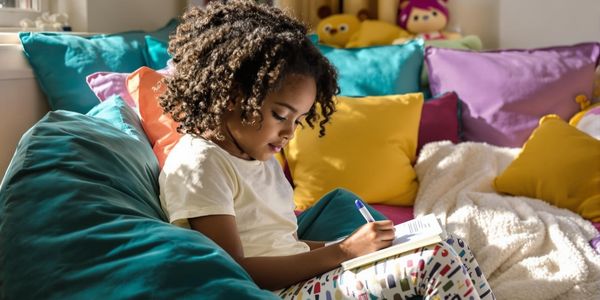Have you ever noticed how excited your child gets when they're deeply involved in something they're genuinely passionate about? Imagine channeling that excitement into their everyday learning!
Project-Based Learning (PBL) does precisely that by transforming education from memorizing facts to exploring real-world challenges that spark curiosity and creativity.
At Outschool, we believe in empowering parents with the best educational insights, so let's explore everything you need to know about project-based learning!
What is project-based learning?
Project-based learning is an educational approach in which children actively explore real-world challenges and solve meaningful problems over an extended period. Instead of passively listening to lectures or memorizing facts, children dive deep into hands-on projects that encourage active participation, critical thinking, and real-world application.
Imagine your child is curious about environmental sustainability. Instead of simply reading about recycling, they could design and implement a recycling program in their community. Through activities like interviewing community members, researching effective recycling methods, and presenting their findings to the neighborhood, they gain invaluable experiences and skills that last well beyond the project.
The core elements of project-based learning
Project-Based Learning isn't just doing a project for the sake of it. It's structured around key elements that enrich your child's educational journey:
Real-world connection
One of the most exciting aspects of project-based learning is connecting classroom learning to real-life situations. When children work on projects that impact their community or the world around them, their learning becomes personal, meaningful, and genuinely motivating.
For example, your child might tackle a local issue such as reducing plastic waste in the community, enabling them to apply academic concepts practically, see tangible results, and realize the power of their actions in making positive changes.
Inquiry and exploration
With project-based learning, children are encouraged to ask questions, investigate ideas, and follow their curiosity wherever it leads. Inquiry-based exploration sparks genuine interest, fosters independence, and cultivates lifelong learning habits.
Imagine your child intrigued by wildlife conservation, through guided inquiry, they could investigate local habitats, collect data, and propose solutions to preserve biodiversity, nurturing their natural curiosity and turning it into meaningful learning experiences.
Collaboration
Project-based learning emphasizes teamwork and communication, mirroring real-world environments where collaboration is crucial. Your child learns to work effectively in groups, resolve conflicts, share responsibilities, and support their peers. These are skills essential in all areas of life.
For example, in a project on historical events, children might collectively research, create presentations, or even reenact critical scenarios, building stronger relationships, respect for diverse perspectives, and practical problem-solving strategies along the way.
Student voice and choice
Giving children a say in their learning journey significantly boosts engagement and responsibility. Whether selecting project topics, deciding how to approach problems, or determining the outcomes, having choices helps children take ownership of their education.
When your child chooses a topic they genuinely care about, such as creating a community garden or designing a video game, they're more likely to invest deeply in the learning process and feel a strong sense of accomplishment in their work.
Reflection and revision
Unlike traditional classroom projects, project-based learning involves continuous reflection and revision. Children regularly assess their progress, learn from mistakes, and strive for improvement, developing critical thinking and resilience.
By reflecting on what worked, what didn't, and how they can improve next time, your child will learn invaluable lessons about perseverance, a growth mindset, and the importance of ongoing self-improvement.
The benefits of project-based learning for kids and teens
Project-based learning helps kids and teens master new concepts while building lifelong abilities. Research shows that hands-on projects lead to deeper understanding and better retention. When young learners tackle meaningful challenges, they develop capabilities that serve them well beyond the classroom.
Personal growth benefits:
- Young learners shape their educational path by selecting projects that match their interests and learning style, boosting motivation and confidence.
- Children practice decision-making as they plan projects, from choosing materials for a science experiment to organizing a community clean-up day.
- Kids build resilience and adaptability while finding creative solutions to challenges during their projects.
Academic success:
- Studies demonstrate improved comprehension when learners connect subjects, like using geometry to design a playground or statistics to study local wildlife.
- Children strengthen research and analytical abilities by investigating questions that matter to them, from environmental conservation to local history.
- Young minds develop planning and organization strategies while managing project timelines and resources.
- Cross-curricular projects, such as building a medieval castle while studying the history of the Middle Ages, deepen understanding by engaging multiple learning areas at once, helping knowledge stick through hands-on, contextual learning.
Social development:
- Kids learn valuable teamwork strategies by collaborating on group projects, from building model cities to producing short films.
- Children communicate clearly while presenting their discoveries to classmates, family, and community members.
- Young people develop empathy and understanding by working on projects that help others and improve their communities.
Skills children develop through project-based learning
Kids who work on meaningful projects build excellent skills beyond traditional academics. The skills children develop through project-based learning prepare them for success in and out of the classroom.
- Develop research and planning abilities by investigating real-world questions that spark curiosity
- Build critical thinking skills through analyzing information and creating innovative solutions
- Strengthen communication abilities by sharing ideas and presenting discoveries to others
- Practice teamwork and collaboration while working together on shared goals
- Grow problem solving capabilities by breaking down complex challenges into manageable steps
- Cultivate empathy and social awareness through community focused projects
- Master time management by learning to set goals and track progress
- Build confidence and resilience when testing new ideas and adapting to challenges
- Apply knowledge in meaningful ways, which reinforces learning. This is known as Knowledge Transfer, which encourages learners to use what they’ve learned in one context to solve problems or create projects
Simple steps to start project-based learning at home
Getting started with project-based learning at home can seem daunting, but it's simpler than you might think. Focusing on your child's natural curiosities and implementing a few straightforward steps can create a dynamic and engaging learning environment in your home.
Start with your child's natural interests
When your child shows natural curiosity about space, animals, or how things work, you've found your project springboard.
Parents can implement project-based learning at home by paying attention to these authentic moments of wonder. Does your 8-year-old love birds? Start a backyard bird sanctuary project.
Is your teen passionate about video games? Design a game review blog or create a simple game.
Create a clear project framework
Set up your project with these manageable steps:
- Planning: Work with your child to outline goals and create a simple weekly schedule
- Research: Gather information through books, online resources, or expert interviews
- Creation: Build, write, experiment, or design based on project goals
- Documentation: Take photos, keep notes, or record videos of the process
- Sharing: Present findings to family or create a display of the work
Set achievable goals
Guide your child through goal-setting by breaking larger projects into weekly targets. A month-long garden project might include:
- Week 1: Research plants and design garden layout
- Week 2: Prepare soil and plant seeds
- Week 3: Create plant markers and care schedule
- Week 4: Document growth and share progress
Let your child lead the way in terms of timing when possible. Many children enter a “flow” state, deep concentration and enjoyment, when fully engaged in a project, and they may work for hours without needing a break. Supporting that natural momentum can lead to more meaningful and lasting learning.
Use available resources
Transform everyday spaces into learning opportunities:
- Kitchen: Perfect for cooking projects and simple science experiments
- Backyard: Ideal for nature studies and environmental projects
- Local community: Connect with libraries, parks, and community centers
- Online resources: Access expert guidance and project ideas
Projects don't require expensive materials or complicated setups. Focus on using readily available resources and your child's natural drive to explore and create.
Support without overmanaging
Guide your child's learning while encouraging independence:
- Ask open-ended questions to spark thinking
- Provide support during challenging moments
- Celebrate both discoveries and mistakes
- Adjust timelines when needed to maintain engagement
Ready to see these steps in action? The next section explores real-world project examples that bring these principles to life.
Frequently asked questions (FAQs)
Ready to start your project-based learning journey? Many homeschool families have questions about bringing hands-on, project-based learning into their daily routine. Here are answers to common questions that will help you create engaging learning experiences at home.
What level of parent involvement does project-based learning require?
Parents serve as learning partners and facilitators rather than traditional instructors. Your role involves helping brainstorm ideas, gathering resources, and offering guidance when needed. Still, the magic happens when you step back and let your child take ownership of their project journey.
How can I track my child's progress?
Create a simple digital portfolio using photos, videos, and samples of your child's work to document their learning journey. Regular conversations about their discoveries, challenges, and next steps provide valuable insights into their growth.
Can project-based learning cover core academic subjects?
Yes! Projects naturally weave together multiple subjects as children explore real-world topics. A garden project might include math for planning, science for plant growth, and writing for documentation.
What if my child loses interest in a project?
Break projects into smaller milestones and celebrate progress along the way. Adjusting the project scope or finding a fresh perspective can renew enthusiasm. Remember that learning to navigate challenges builds valuable problem-solving skills.
How can I combine online learning with project-based activities?
Live online classes can complement hands-on projects by providing expert guidance, peer collaboration, and structured learning support. Look for courses that align with your child's project interests and can help deepen their understanding of specific topics or skills.
Empower your homeschool journey with project-based learning
Getting started with project-based learning at home transforms everyday moments into rich learning experiences. When children explore topics through hands-on projects, they retain information better and develop deeper understanding, especially in a personalized home learning environment.
You create meaningful learning opportunities that spark curiosity and build lasting skills by connecting lessons to real-world experiences, from neighborhood clean-up initiatives to family heritage projects.
Looking for inspiration and support on your project-based learning journey? Outschool offers engaging live classes, enriching activities, and a vibrant community of families who share your passion for creative, hands-on learning. Browse our collection of project-based courses to find the perfect starting point for your family's next learning adventure.






.svg)
.svg)







